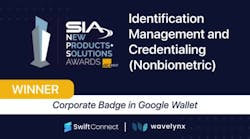LAS VEGAS - As the Product Line Director for Tyco Security Products’ Software House, Kantech and CEM Systems brands, Jason Ouellette is the man helping chart the roadmap of product innovation and strategic planning for his company. But when it comes to interaction with the Tyco customer base, including integrators and end users, navigating a smooth ride is not always easy. Not that technology solutions being offered aren’t top-notch, it’s just that given the security industry’s sudden penchant for mergers and acquisitions, his customer base is understandably nervous.
Tyco and other umbrella security conglomerates that are displaying solutions at this week's ISC West security conference in Las Vegas face the pressure of delivering on promises and allaying customer fears that systems purchased during the last budget cycle won’t be obsolete come the next.
“Ultimately with all these transactions {mergers} there is a sense of anxiety that sometimes engulfs our customers. A lot of what has occurred -- like what happened with Casi systems that are now being ripped out and replaced -- has had a tremendous impact on both the integrator and end user,” admits Ouellette. “The impact of these mergers and acquisitions leave our customers wanting that assurance that the investment they are making with us or other vendors will be protected. The want to know what are the long-term roadmaps and what flexibilities do they have in an open standards environment. They are asking that if Tyco takes a left turn and I don’t like the direction and find a need to switch manufacturers, I don’t have to make that difficult decision to change everything I currently have installed.”
Security vendors like Ouellette and Lenel’s Ross McKay, who is the company’s Director of Product, don’t want to have to see their customers worry about the longevity of product and viability of solutions. Creating goodwill and maintaining both the integrator and end user’s confidence is paramount.
“When you get into conversations about open systems versus proprietary features, every manufacturer is going to tell you that his solution is the best and that they are network savvy enough to take the client to the next step,” says Ouellette. “And now we hear the conversation going in the direction of cyber security because that is where things are as you deal with the software and communication between devices, which are all becoming IP-centric. Whether it is wireless locks or the door control modules that are compressing down to edge device that is IP-based, meeting the challenges end users face in future-proofing their systems is what we need to be doing – not calming fears that their vendor may not be here tomorrow because of a merger or acquisition.
So what customers are looking for is the creditability. It is nice you say it but why should we trust? What are the standards that dictate that when I put your product in we are not vulnerable because of your product.”
McKay has Lenel following that same philosophy. He believes the more the end user knows the better and the more they share – even better.
Part of the answer of alleviating customer angst is staying in touch with their concerns, and Lenel does this through their series of customer focus groups. Several universities around the country that use Lenel’s OnGaurd solution currently run their own annual users conference that has evolved into a self-maintaining Users Group. This has become an invaluable information resource for McKay and his product developers.
“We get a lot of great feedback and good ideas. The oil and gas companies out of Texas are setting up the first super region Oil and Gas users group and Lenel convenes an East Coast and West users group once a year which is built around the product development cycles,” McKay says. “Using feedback from these events helps our product managers and engineers understand customers’ needs and drives product innovation.”
“We have created a pretty good format for brainstorming that usually takes about a half day. We go around the table and get requirements from our users and then force rank the issues from one to twenty so we can get a consensus amongst the group,” McKay explains. “We use these force-ranked lists to prioritize our decision-making. A year ago we took the top 42 ideas we got from all our user groups and put them up on an online survey and asked our customers to force rank their concerns and ideas. The bottom line is Lenel will keep an audit trail of feedback from their user group to enhance product development.”
Ouellette also believes that the push for standards forces more of the open architecture discussions which will eventually benefit his customers. The standards movement helped the Federal government to revamp its protocols for access and authentication, which Ouellette thinks will eventually migrate to the private sector.
“I do think a lot of what is being learned out of the government standards initiatives, whether it is for PIV, FIPS or FICAM, and certainly getting into identity management, the perfect proving ground. The government has been spending lots of money on the creation of these standards and manufacturers like Tyco have invested lots of money trying to figure out ways to apply it. The user wants this high assurance but at what price at the expense of your time to get the transaction at the door,” he says. The government has become a great breeding ground for the longevity and investment to really prove a lot of these things that become the seeds for innovation that drive the commercial versions of these products.”
About the Author:
Steve Lasky is the editorial director for SouthComm Security Media Group and its conference director for Secured Cities. He is a 30-year security veteran and ASIS member.


